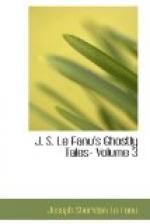Startled at their approach, a bird like a huge mackaw bounced from the boughs of the trees, and sped away, every now and then upon the ground, toward the shelter of the forest, fluttering and hopping close by the side of the little brook which, emerging from the forest, winds into the glen, and beside the course of which Sir Bale and Philip Feltram had ascended from the margin of the lake.
It fluttered on, as if one of its wings were hurt, and kept hopping and bobbing and flying along the grass at its swiftest, screaming all the time discordantly.
“That must be old Mrs. Amerald’s bird, that got away a week ago,” said Sir Bale, stopping and looking after it. “Was not it a mackaw?”
“No,” said Feltram; “that was a gray parrot; but there are stranger birds in Cloostedd Forest, for my ancestors collected all that would live in our climate, and were at pains to find them the food and shelter they were accustomed to until they grew hardy—that is how it happens.”
“By Jove, that’s a secret worth knowing,” said Sir Bale. “That would make quite a feature. What a fat brute that bird was! and green and dusky-crimson and yellow; but its head is white—age, I suspect; and what a broken beak—hideous bird! splendid plumage; something between a mackaw and a vulture.”
Sir Bale spoke jocularly, but with the interest of a bird-fancier; a taste which, when young, he had indulged; and for the moment forgot his cares and the object of his unwonted excursion.
A moment after, a lank slim bird, perfectly white, started from the same boughs, and winged its way to the forest.
“A kite, I think; but its body is a little too long, isn’t it?” said Sir Bale again, stopping and looking after its flight also.
“A foreign kite, I daresay?” said Feltram.
All this time there was hopping near them a jay, with the tameness of a bird accustomed to these solitudes. It peered over its slender wing curiously at the visitors; pecking here and nodding there; and thus hopping, it made a circle round them more than once. Then it fluttered up, and perched on a bough of the old oak, from the deep labyrinth of whose branches the other birds had emerged; and from thence it flew down and lighted on the broad druidic stone, that stood like a cyclopean table on its sunken stone props, before the snakelike roots of the oak.
Across this it hopped conceitedly, as over a stage on which it figured becomingly; and after a momentary hesitation, with a little spring, it rose and winged its way in the same direction which the other birds had taken, and was quickly lost in thick forest to the left.
“Here,” said Feltram, “this is the tree.”
“I remember it well! A gigantic trunk; and, yes, those marks; but I never before read them as letters. Yes, H.F., so they are—very odd I should not have remarked them. They are so large, and so strangely drawn-out in some places, and filled-in in others, and distorted, and the moss has grown about them; I don’t wonder I took them for natural cracks and chasms in the bark,” said Sir Bale.




